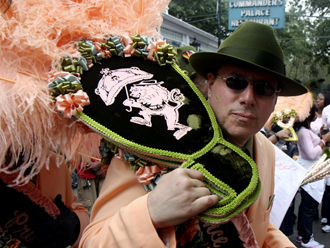Second Line Makes the Grade
A service-learning project that was part of a Tulane communication and American studies class took students into the New Orleans community to record oral histories of the Prince of Wales Social Aid and Pleasure Club. Now their work, accompanied by photographs, has been published on a new website for the award-winning public radio program, "American Routes."

Dressed in his Prince of Wales finery, Joel Dinerstein is ready for the parade. He also is associate professor in the Tulane Department of English. (Photo by Jason Saul)
The project began last fall in a class called "The Interview: Cultural Conversation as Cultural Conservation," taught by Nick Spitzer, a professor of American studies and anthropology who also happens to be host and producer of "American Routes." The weekly radio program is produced in New Orleans in collaboration with the School of Liberal Arts at Tulane.
Spitzer's students, including those working on service-learning projects, interviewed members of the Prince of Wales club in October, during the group's annual second-line parade. Their recordings, interspersed with brass band music from the parade, aired nationally on "American Routes" on Feb. 10. The program is posted in the show's archive.
Then, on Feb. 18, a website launched, including a slide show that accompanies the interview segment and other material.
Spitzer calls the students' work "audio documentaries."
"As a folklorist, I've always believed that when you record something and put it into public discourse, you're encouraging freedom and continuity for people to creatively carry their sense of community and tradition into the future in new and useful ways," he said.
Prince of Wales, founded in 1928, is one of New Orleans' oldest social aid and pleasure clubs. One member interviewed said the group is proudest of being "one of the best-dressed clubs in the city."
"There's a feeling of spontaneous joy you that you can only get from a second line," he said.
Spitzer received a community-based research grant from the Tulane Center for Public Service to support the group interview project.
